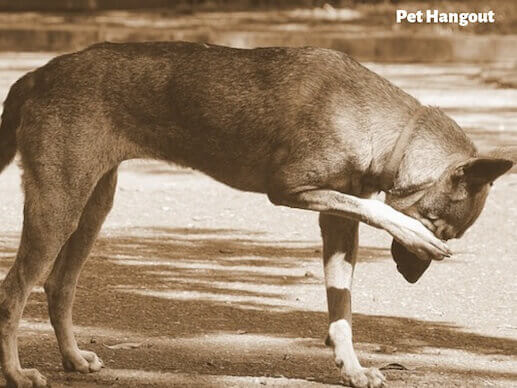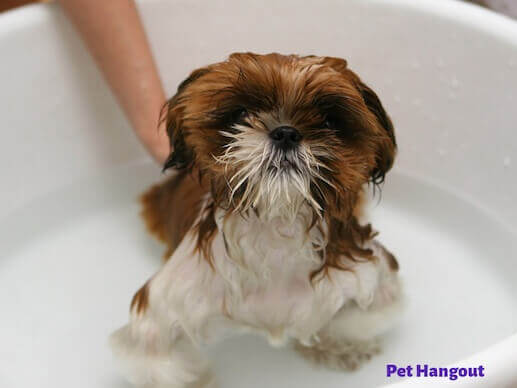Your shopping cart is empty!
MENU
- +
- Pet Lovers +
-
Cool Dogs+
-
Cool Cats+
- Grooming +
-
Health & Safety+
-
Home or Travel+
- +

Hay fever got your pooch down?
What is hay fever anyway?
Pollen or dust can irritate the mucous membranes of the nose and eyes. The reaction is sneezing, a runny nose, and itchy eyes.
If you have ever had seasonal allergies, you know it can be a miserable feeling.
The main problem is, your dog can’t tell you, “hey, my allergies are starting to act up. Can you give me some meds..?”.

Statistics are currently telling us that about 10% of dogs suffer from some type of allergies. That is a lot of pups considering how many people own a dog in America!
As of March 2017, there are 89.7 million dogs reported to be living in a U.S. household. (source: www.statista.com) So 10% of this huge number is over 8 million dogs affected with some type of allergy!
That is a significant number of dogs suffering I would say.
How to Know If Your Pup is One of Them
Possible Signs:

Develop Allergies Later:
Your pup could also show allergies later in life if they have a big change in their living environment.
Moving to a new home, going from being an inside to an outside dog, being in a protected environment early in life (to where their immune system couldn't build against allergens), or living in a different climate when they were a puppy could cause allergies to develop later in life.
Serious health issues/medicine could also compromise their immune system to where allergens begin affecting them.

What You Can Do To Help:
1 - When you see any of the signs listed above, the first thing you need to do is to rule out other health issues.
For example, lots of scratching could be a sign of fleas. You will want to make sure there aren’t other health issues going on with your pup before diagnosing with allergies.
A trip to the vet is always a good thing if you are unsure about the symptoms you are seeing.
2 - Once you’ve determined that your dog is suffering from allergies, try to figure out the source or sources of the allergens. Is it excessive mold somewhere in their environment?... is it the pollen and grasses outside?... or excessive dust where they sleep?, etc.
3 - If possible, remove the source of the allergen! For example, if there is too much dust, clean it up!
If it is grasses or pollen, control when your dog is around it. Early mornings and late afternoons are lower in pollen counts normally.

If it is the grass, try to keep them off freshly cut grass for the first day.
4 - Give a general antihistamine like Benadryl. Not sure how much? Check out Pet Hangout’s post on How Much Benadryl can you Give a Dog.
If your dog is having specific symptoms like a constant runny nose, your vet may prefer to put them on more of a targeted med like a nasal spray.
5 - Keep their bedding washed at least weekly to wash away allergens that may ride in on your pup.

6 - Wash your dog at least weekly to get allergens away from your pup. And speaking of allergies, be sure you don't introduce more trouble to your dog with the type of shampoo you use. Some contain terrible irritants that could further aggravate your dog's condition.
Some that I personally recommend for being hypoallergenic and soothing to itchy skin:

7 - If you suspect mold and/or dust may be the culprit, an air purifier running in your dog’s sleeping area could help greatly too.
8 - Don’t forget that it could be food allergies that is getting your dog. If you suspect this, try changing to a totally different, but quality (Grain-Free), brand of food. To get great quality, be prepared to pay a bit more (just remember, with dog food, you truly do get what you pay for!)
These dry dog foods are proven very effective for dogs with food allergies:
9 - Give a grain-free supplement to strengthen their Immune System. When a dog's immune system is running at optimum, they are able to ward off sickness and many allergic reactions!
10 - Make sure they are drinking plenty of fluids. This will help flush the allergens from their system.
A drinking fountain also helps encourage proper drinking - it's fun and keeps the water fresh for your pup always! I love this one from Drinkwell and it has awesome customer reviews.
If they still won’t drink their water, entice them by adding some enhancing drops to their water. You can get the tiny bottles in the grocery store that have all types of fruity flavors for adding to water!

Lastly:
If you cannot get any relief for your dog, definitely schedule a visit to the vet for a health assessment.
Summary:
Remember, there could be many culprits of why your dog is having an allergic reaction. You will want to initially rule out any other health issues, like fleas or diseases that could be causing the symptoms.
Once you have done this, taking steps to determine what the allergens could be are key to helping your pup overcome. It may be a process of elimination but if you keep at it, you will eventually find the source of their allergies.
After that, it's just a matter of managing the source to keep your pup happy and healthy!
Does your furry canine suffer from allergies?
How do you manage it?
For other helpful reads on your pet's health, you will want to read Why Is My Poor Dog's Hair Falling Out and How to Groom Your Small Pooch Like An Award Winning Pro!
For more on Dog Allergies, you might like to read Animal's Planets post on Dog Allergy Treatments too.